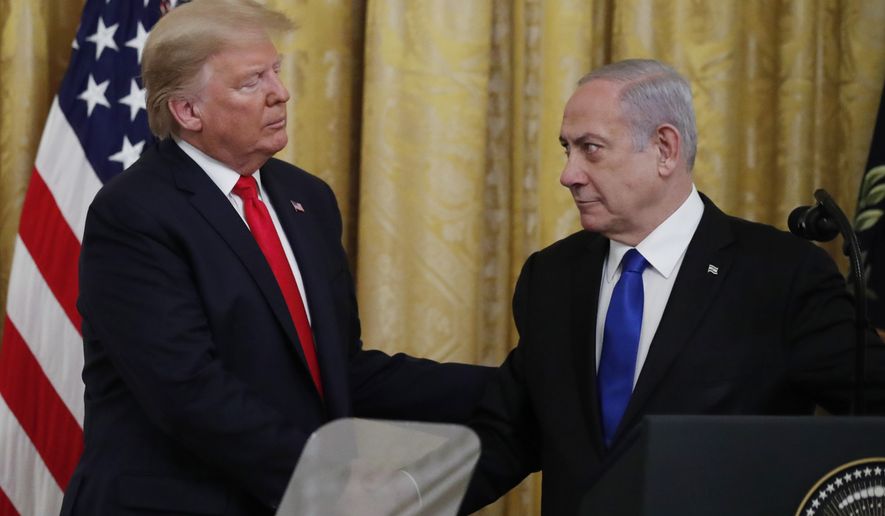OPINION:
As an elected official from Israel, I traveled to Washington D.C., at the request of Prime Minister Netanyahu to witness the unveiling of the highly anticipated “Deal of the Century.” Like most Israelis this plan has the potential to radically change the trajectory of my country so it was with eager anticipation that I awaited the Peace to Prosperity (The Plan) presentation.
The creators of the plan actually based it partially on interviews with the people who live in the disputed territories and as a result formulated an approach that is based upon the understanding that neither the Arabs nor the Israelis are leaving the disputed territories of Judea and Samaria. We are both here to stay. The Plan recognizes Israel’s historical connection to the entire region; affirms that no Jew should be forcefully evacuated from their home (yes, Israel has tried that before), and the commencement of the application of Israeli sovereignty in those territories.
While I was excited to hear that and more, there are parts of the Plan that don’t sit so well with me. I never dreamed that I would hear President Donald Trump use the terminology “Palestinian State.” It was hard to digest U.S. recognition of the eastern neighborhoods of Jerusalem as the Palestinian capital. No, this plan does not embrace all that of our demands, yet there is no doubt that we must make this plan a reality.
I am the elected mayor of Efrat in the county of Gush Etzion, a region that came under Israeli control after Israeli’s Six-Day War in 1967. We are fortunate to be experiencing tremendous demand in housing leading to increased development. Now, all Israelis have to deal with the arduous bureaucratic permitting process that such construction mandates.
However, you may be surprised to learn that in my city we have another hurdle. Since Israel never applied Israeli law to the territory it liberated during the Six-Day War, basic municipal services such as building permits require the authorization of Israeli military’s ‘civilian administration.’
If you thought government bureaucracy is bad, imagine the amount of red tape that military combined with local government would generate. The Plan calls for the commencement of the application of Israeli law throughout the land, which would remove the military from their administrative role.
Historically, Israel has refrained from significant real estate development throughout Judea and Samaria due to international pressure. While there remain restrictions, this plan allows for the opportunity to build far beyond the suffocating restrictions we have been used to, for years.
The Obama administration, actually pressured Israel to accept a complete construction freeze, barring any development whatsoever. Not surprisingly this administration understood the fallacy of considering Israeli homes, an obstacle for peace. This plan gives us the legitimacy for the first time in more than 50 years to be the masters of our domain.
And what of the Palestinians? They are offered the trappings of their own state once they make the necessary changes to come into compliance with what the Plan deems as a pre-requisite to be considered a partner for peace. I mean seriously, how can any entity claim to be a legitimate partner for peace when they continue to pay terrorists and incentivize terrorism?
Hamas and Islamic Jihad would need to completely demilitarize. Palestinians must completely reject their culture of corruption and human rights abuses and replace it with one that protects freedom of religion, press and more. The Palestinian Authority has consistently refused to pursue those reforms, yet it is only if those conditions are met, can they achieve a semblance of statehood, yet without a military to threaten Israel.
Should the Palestinians achieve all of those goals, they would completely revolutionize themselves to an entity that would not nearly be so threatening to Israel, making peace plausible. However, what this plan also does is canonize U.S. policy, that to be a partner for peace the Palestinians must fulfill all of the above conditions. And currently, they are not close to meeting that standard.
The presence of representatives of Oman, Bahrain, the United Arab Emirates at the unveiling of the plan demonstrates that the impact of this plan goes way beyond setting Israel’s borders. It has the opportunity to open up trade and economic opportunity with regional countries which have never been accessible to Israelis.
Yet there remain definite concerns — genuine security challenges, Jerusalem, the tunnel corridor that bisects Israel, securing Hebron, etc.
Yet for all its shortcomings, this Plan is genuinely historic. In 1948, for the first time in 2000 years, the world recognized the establishment of a Jewish state. This plan recognizes Jerusalem as its capital with Judea and Samaria as an integral part of it. I choose to embrace the achievements, face the challenges and acknowledge the privilege that I was given to be an Israeli Jew who lives and builds in Gush Etzion where our ancestors established our nation, and where we will be able to, finally, apply Israeli law.
• Oded Revivi is the mayor of Efrat and the chief foreign envoy of the YESHA Council of Mayors in Judea and Samaria.




Please read our comment policy before commenting.